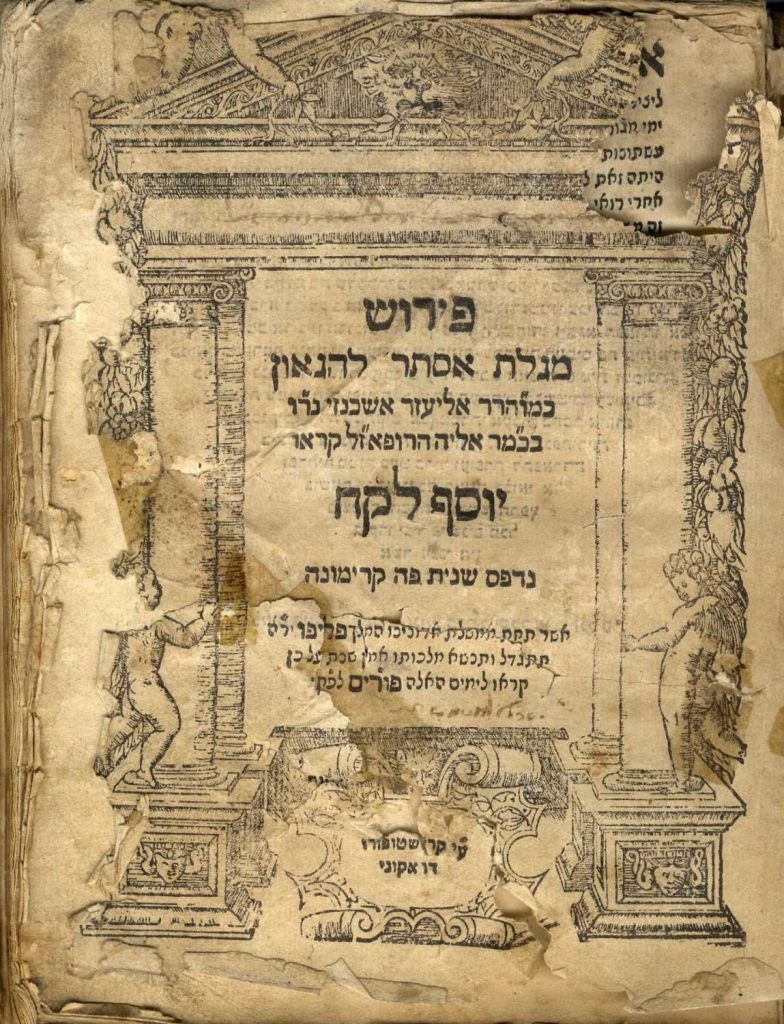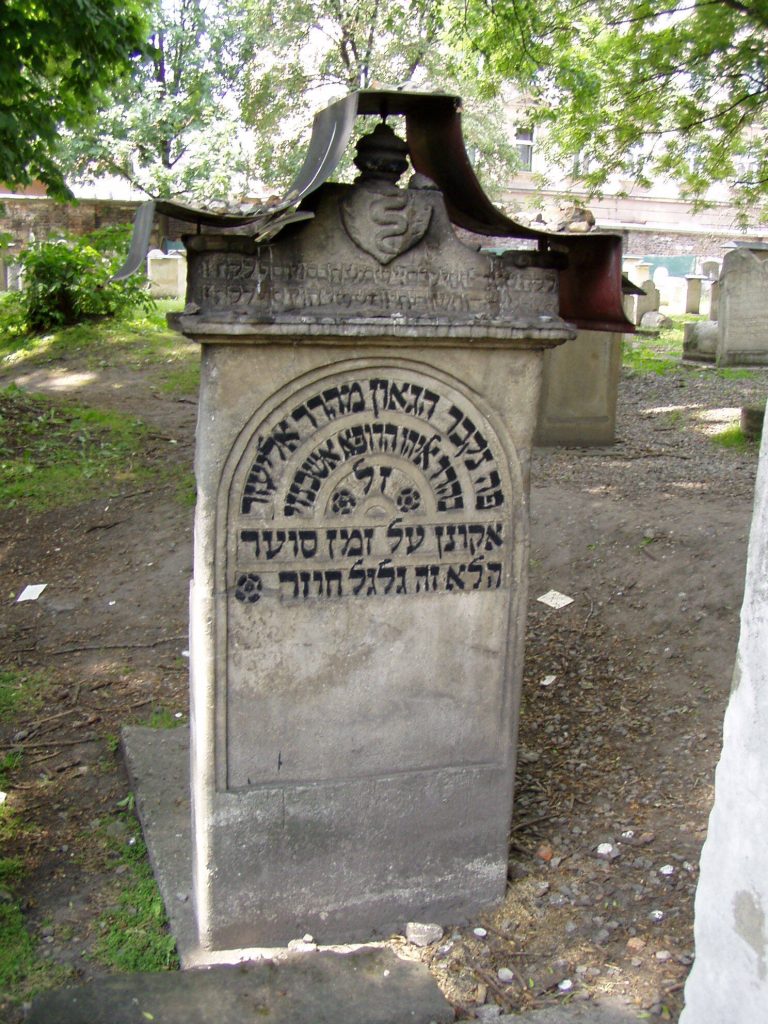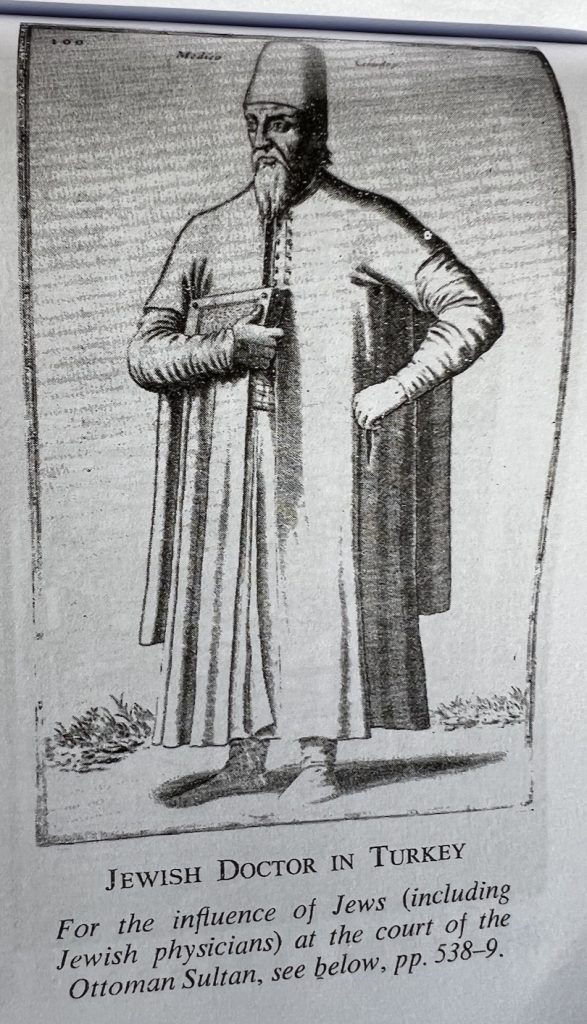Eliezer Ashkenazi was a peripatetic rabbi, physician and prolific scholar who seems likely — despite his different surname — to have been a son of Dr. Eliyahu and Fioretta Chalfan. Eliezer’s epitaph says he is son of Dr. Elia. Both Eliezer (Provençal Responsa 96) and Dr. Eliyahu Chalfan (Isserles Responsa 56) say they are descendants of Rabbi Joseph ben Solomon Colon, MaHaRIK. So either Rabbi Eliezer is the son of Dr. Eliyahu Menachem Chalfan or he is the son of a different Dr. Elia who is either a grandson of Josef Colon or married to a granddaughter of Josef Colon. The different surname can be explained by his long presence in Egypt early in his career, where all Jews who were not originally from Egypt or the Levant were referred to as “Ashkenazi.”
The Jewish Encylopedia describes him as follows:
Rabbi Eliezer Ashkenazi received his Talmudic education under Joseph Taitazak in Salonica. Ashkenazi first became rabbi in Egypt 1538-60, probably at Fostat (now Cairo), where, by his learning and wealth, he became widely known. Compelled by circumstances—doubtless of a political nature—to leave Egypt, he went to Cyprus, remaining there for two years as rabbi at Famagusta.
A desire to visit foreign lands and to observe foreign peoples impelled him to give up this position and to travel. He went first to Venice; but a disagreement with the rabbis, Meïr Padua and his son Judah Katzenellenbogen, caused him to leave the city and in the same year to take up his residence at Prague (1561). Here—either because he was a rabbi, or, at all events, because he was a leading authority—his was the first signature appended to the 1564 constitution of the burial society of the congregation. After leaving Bohemia and proceeding eastward as far as the Crimea [?], Ashkenazi returned to Italy, not before 1570. While rabbi of Cremona he published there (1576) his work, “Yosef Leka?” (Increases Learning; compare Prov. i. 5), dedicated to Joseph Nasi, duke of Naxos, which was several times reprinted. Four years later he was again in eastern Europe, as rabbi of Posen. In 1584 he left that city to take up his abode in Cracow, where he died in 1585.
Ashkenazi’s printed works, besides the “Yosef Leka?,” are the following: (1) A commentary on the Book of Esther; (2) “Ma’ase ha-Shem” (The Works of God; Venice, 1583; several other editions), a commentary on the historical portions of the Pentateuch, written for the instruction of his son Elijah, and containing also a complete commentary on the Passover Haggadah, which has frequently been published separately; (3) eight “seli?ot” (penitential prayers), included in the Bohemian liturgy; (4) a “toka?ah” (homily), published by his son. His supercommentary to Na?manides, and his critical marginal notes—said to number one thousand—on Joseph Caro’s “Bet Yosef,” have not been preserved.
Though Ashkenazi can scarcely be said to have exercised an influence either on his own or on later times, his personality was an extraordinary one for that age. He may be called the last survivor of a most brilliant epoch in the history of the Sephardim. During a period when, in Germany and Poland, the hair-splitting dialectics of Jacob Polak could achieve a triumph, and, in Egypt and Palestine, the mysticism of Isaac Luria could confuse the clearest intellects, Ashkenazi preserved an impressive independence of thought. Although educated by a fanciful cabalist, and a fellow-pupil of Moses Alshech, yet he was a student—if not a deep one—of philosophy and physics. As a Talmudist, such men as Joseph Caro, Moses Isserles, and Solomon Luria considered him of equal authority with themselves; but when the rabbinical decisions of the old rabbis ran counter to sound judgment, he never sought a sophistical justification for them, as was then the custom, especially in Poland.
Valuable material for a correct estimate of Ashkenazi may be found in several of his decisions preserved in the responsa literature of the time. In Venice he decided that a man could be forced to a divorce, if, by immoral conduct, he had incurred his wife’s aversion (Isserles, Responsa, No. 96). It was probably this decision which brought upon him the opposition of the above-mentioned Venetian rabbis, though he was connected with them; for Ashkenazi’s son was Katzenellenbogen’s son-in-law. From the standpoint of strict Talmudic interpretation, Ashkenazi’s opponents were in the right; since his sentence contravened that of the Tosafists, who for the German-Italian Jews constituted, as it were, a court of last resort.
The Jews of Poland were still less capable of comprehending such a personality than were those of Italy. The following occurrence affords a striking instance of this fact: The “roshe yeshibot” (heads of academies) had forbidden their pupils to establish a rival academy in close proximity to their own. Ashkenazi declined to assent to this resolution, when requested. At the same time, he complained in a letter to Joseph b. Gershon ha-Kohen, the “rosh yeshibah” at Cracow, that, although the decision of the Polish rabbis was based upon the authority of Maimonides, yet he considered it irreconcilable with freedom of instruction among Jewish rabbis. How little he was understood by his Polish colleagues is fully displayed in the reply of the rabbi of Cracow, who at great length vindicates Maimonides’ standpoint by erudite and astute references to the Talmud (Joseph b. Mordecai Gershon, “She’erit Yosef,” No. 19). Consequently, J. S. del Medigo is justified in his remark that Ashkenazi remained unknown to the Poles, and he applies to him wittily, if somewhat audaciously, the verses: “Thou hast brought a vine out of Egypt: thou hast cast out the heathen, and planted it,” etc. (Ps. lxxx. 9 [A. V. 8] to 13 [14]). Ashkenazi had come from Egypt and had to live among the uncultivated Poles.
Ashkenazi’s wife, Rachel, died at Cracow April 3, 1593. Her epitaph, still extant, bears witness to her piety and benevolence (“Monatsschrift,” xliv. 360). His son Elijah published the liturgic collection, “Zib?e Shelamim,” and wrote a short elegy on his father, which was used as the latter’s epitaph.
Encycopedia.com has another biography
ASHKENAZI, ELIEZER BEN ELIJAH THE PHYSICIAN (1513–1586), rabbi and exegete. Eliezer’s activities covered many of the Jewish centers of the 16th century. The influential position he held in widely scattered communities indicates the basic unity of Jewish society and culture in the period. A pupil of Joseph b. Solomon Taita?ak in Salonika, Eliezer went to Egypt when he was 26, and officiated as rabbi. Elijah of Pesaro said he “judged all the community of Egypt for 22 years.” While there, Eliezer was in contact with the *Safed communit and its sages, including Joseph *Caro, who respected and consulted him. In 1561 Eliezer was compelled to leave Egypt, and settled at Famagusta in Cyprus. Elijah of Pesaro, who met him there in 1563, describes him as “well-versed in 12 languages… a sage in many general sciences and in the Talmud… he is wealthy.” Azariah dei Rossi called Eliezer “the greatest of the generation.” In 1563 Eliezer was in *Venice; the following year he traveled to Prague, returned for a few years to Famagusta, and again went to Venice. From there he went to Cremona where in 1576 he published his commentary Yosef Leka? on the book of Esther, dedicated to Joseph Nasi. The same year he was invited to Poland as rabbi of Poznan; he was subsequently called to Gniezno, and thence to Cracow, where he died. In Poland his answers to legal queries were accepted as authoritative. Impartial in his decisions, he denied his support to the brother-in-law of Moses Isserles, Joseph Katz, who had referred to Eliezer in a discussion with his own pupils. Eliezer’s main work, Ma’aseh Adonai, a commentary on the Torah, was completed in Gniezno in 1580 and printed in Venice in 1583. It follows the rationalist trend in rabbinical scholarship, calling for freedom in exegesis of the Scriptures: “Each and every one of us, our descendants too, to the end of all generations… is obliged to search for the meaning of the words of the Torah… to accept the truth from whoever says it, after we have understood it. Let us not permit the opinion of someone else – even if of an earlier generation – to hinder us from research… Research and choose: for that you have been created and reason has been given you from heaven” (Ma’aseh Adonai, 169). Eliezer suggests that irrational elements in Jewish tradition had accrued through copyists’ errors, misunderstandings, and misreadings, or had been precipitated in times of trouble and expulsions, or even inserted by ill-disposed persons. In Joseph Solomon Delmedigo’s estimation “the Ma’aseh Adonai should be read in its entirety.” He also records that Eliezer wrote a supercommentary on Na?manides’ commentary on the Torah and “a thousand refutations of the Beit Yosef” of Joseph Caro. Eliezer also wrote seli?ot and piyyutim printed at Cracow and in Lublin (1618). His glosses on the code of Mordecai b. Hillel are included in Gedulat Mordekhai (Hanau, 1593).
If Eliezer Ashkenazi is in fact the son of Dr. Eliyahu and Fioretta, then his grandfathers were both astronomers and he could be the same as a man known as Eliezer the Astronomer in the Jewish Encyclopedia
ELIEZER THE ASTRONOMER:
By: Richard Gottheil, Isaac Broydé
German scholar of the sixteenth century; author of “Ge ?izzayon,” an astrological compilation fromHebrew, Arabic, and Latin sources (Neubauer, “Cat. Bodl. Hebr. MSS.” No. 2066). He quotes Abraham bar ?iyya ha-Nasi, Ibn Ezra, Andruzagar, Albumazar, ‘Ali ibn Ri?wan, ‘Ali ibn Rajil, Leopold of Austria, Johannes, Guido Bonatti, and, according to Dukes, Copernicus. In the introduction Eliezer says he began a great work on astrology, a chapter of which, entitled “Reshit ?okmah” (quoted by Neubauer, l.c.), is devoted to Ibn Ezra. Whether the “Sefer ha-Goralot” (Vatican MS. No. 216), bearing the name “Eliezer,” is by the same author is not known. The same uncertainty prevails regarding Vatican MS. No. 477, which contains a commentary on Ptolemy’s “Centiloquium,” and which also bears the name “Eliezer.”
Also note that the grave in Krakow may be a duplicate of another grave that was found nearby in Stabnitz (Stopnica?). See Sefaria.org “There is also a remarkable thing in this matter, it has become known to us that in the community of Stabnitz (Stopnica?) about 20 miles from here there is found a grave with the name of Rabbi Eliezer Ashkenazi, son of the Rabbi Eliyahu the doctor, author of Maaseh Hashem from the same time.”




